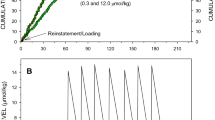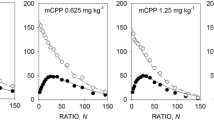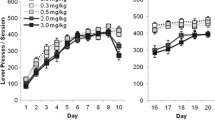Abstract.
Performance on progressive ratio schedules has been proposed as a means of assessing the effects of drugs on "reinforcer efficacy". It has been proposed that the effects of neuroleptic drugs on operant behaviour are mediated by a reduction of "reinforcer efficacy". We examined the effects of two "conventional" neuroleptics (haloperidol and chlorpromazine) and an "atypical" neuroleptic (clozapine) on progressive ratio schedule performance; d-amphetamine was used as a comparison compound. In experiment 1, rats responded for a sucrose reinforcer on a time-constrained progressive ratio schedule (75-min sessions). After 66 preliminary training sessions, the rats received single doses (IP) of haloperidol (0.05, 0.1 mg kg–1), chlorpromazine (2, 4 mg kg–1), clozapine (0.5, 1, 2, 4, 8 mg kg–1), and d-amphetamine (0.2, 0.4, 0.8 mg kg–1), and the corresponding vehicle solutions. The highest ratio completed was reduced by haloperidol and chlorpromazine, and increased by clozapine. All three neuroleptics reduced the peak response rate, at least at the highest doses administered. Response rates on the lower and intermediate ratios could be described by a three-parameter equation proposed to account for fixed ratio schedule performance. Haloperidol reduced, and clozapine dose-dependently increased the "motivational" parameter (a); d-amphetamine reduced it at low doses and increased it at high doses. The three neuroleptics increased the "response time" parameter (δ). Un-reinforced locomotor behaviour, measured in experiment 2, was not significantly altered by haloperidol, chlorpromazine or clozapine, but was increased by d-amphetamine. These results are consistent with a reduction of reinforcer efficacy produced by haloperidol and an increase produced by clozapine; clozapine's effect is unlikely to reflect a general increase in locomotion. All three neuroleptics induced some degree of motor debilitation. The quantitative analysis of progressive ratio schedule performance may provide a useful adjunct to existing methods for separating effects of drugs on motivational and motor processes.
Similar content being viewed by others
Author information
Authors and Affiliations
Additional information
Electronic Publication
Rights and permissions
About this article
Cite this article
Mobini, S., Chiang, TJ., Ho, MY. et al. Comparison of the effects of clozapine, haloperidol, chlorpromazine and d-amphetamine on performance on a time-constrained progressive ratio schedule and on locomotor behaviour in the rat. Psychopharmacology 152, 47–54 (2000). https://doi.org/10.1007/s002130000486
Received:
Accepted:
Published:
Issue Date:
DOI: https://doi.org/10.1007/s002130000486




